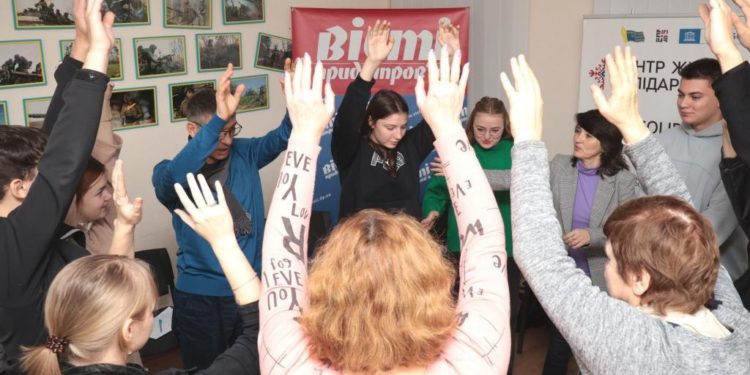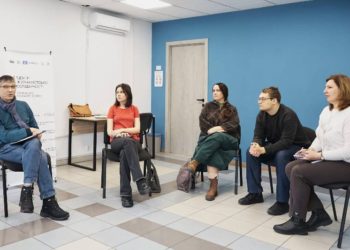How to cope with anxiety? What resources does a person have for this? What methods of support and stress management exist? This was discussed during a psychological workshop at the Dnipro Journalists’ Solidarity Center (JSC) of the National Union of Journalists of Ukraine (NUJU). Together with a psychologist and coach of the GOLOS PROJECT non-governmental organization Oleksandr Makukha, media workers learned to listen to the signals of their own body, thoughts, and emotions and to control themselves during an anxious state.
In the third year of the war in Ukraine, the problem of maintaining the psychological stability of media workers is becoming increasingly urgent. Sensitive and traumatic topics, risks, and challenges caused by enemy attacks are exhausting not only physically but also psychologically. And the constant accumulation of emotional tension leads to burnout, anxiety, and other negative consequences.
The participants of the meeting talked about the difference between fear and anxiety. These emotional states arise in response to danger, threats, adversity, and so forth but have different natures and mechanisms of action. After all, it is worth understanding that fear is usually associated with a specific, obvious danger and prompts a “fight or flight” reaction. On the other hand, anxiety is a similar state, but the cause of which is remote. If something can be done with fear, in particular its cause, then in the case of anxiety – no. But it is there, and it is very exhausting. And the only way out is to listen to yourself and find ways to cope with it.
Together with a psychologist, the participants considered three important human resources: the body, emotions, and thoughts. They can be used to stabilize the psychological state. In particular breathing techniques, for example, help reduce the physical manifestations of anxiety, namely rapid heartbeat and muscle tension. We also talked about how anger and aggression can help cope with anxiety, how to use imagination to combat stress, and how to change the focus of attention.
During the workshop, participants shared their own observations about how constant anxiety and stress affect both their professional and personal lives. These include problems with concentration and organization of work time, disturbed sleep due to intrusive thoughts, and loss of interest in reading literature, writing poetry, and other creative activities that were previously part of life. Some participants noted that exhaustion makes it difficult to get to work, which creates many reasons to postpone work. There are also those who feel so overwhelmed that they think about quitting their media career and changing their field of activity.
Despite this, the workshop became a place for its to not only share their experiences but also get answers to questions, support, and practical recommendations on how to cope with anxiety and stress.
So, to remain psychologically stable, you should listen to the advice:
- Try to follow a sleep schedule, eat well, and lead a healthy lifestyle.
- Move regularly, and do sports. Physical activity, even a light walk, helps reduce the level of cortisol, the stress hormone, in the body. Also, arrange for yourself relaxation (anything that helps relax the body).
- Do not underestimate the importance of breathing. Calm, deep breathing calms the nervous system. For example, try breathing “in a square:” inhale through your nose for four seconds, hold your breath (for another four seconds), exhale through your mouth for four seconds, and hold it again for four.
- Do not forget about the importance of rituals – these are simple actions that create a sense of stability and confidence. This can be morning coffee, a walk, planning your day, etc. Regular rituals help to organize your thoughts and regain a sense of control in conditions of chaos.
- Distinguish between your own and other people’s emotions, organize and reject harmful thoughts – these skills will help you manage yourself and your life.
- People need people, so communicate, take care of others, and seek help if you need it.
- Take care of yourself because this is the foundation of your mental health.
Call the Dnipro JSC by dialing 050 919 8479 (JSC coordinator Nataliya Nazarova). The Center’s address is 8 Starokozatska Street.
ABOUT JSC
The Journalists’ Solidarity Centers is an initiative of the NUJU implemented with the support of the International and European Federations of Journalists and UNESCO. The initiative is designated to help media representatives working in Ukraine during the war. The Centers operate in Kyiv, Lviv, Ivano-Frankivsk, Chernivtsi, Zaporizhzhia, and Dnipro and provide journalists with organizational, technical, legal, psychological, and other types of assistance.
ABOUT UNESCO
UNESCO is the United Nations Educational, Scientific, and Cultural Organization. It contributes to peace and security by promoting international cooperation in education, sciences, culture, communication, and information. UNESCO promotes knowledge sharing and the free flow of ideas to accelerate mutual understanding. It is the coordinator of the UN Action Plan on the Safety of Journalists and the Issue of Impunity, which aims to create a free and safe environment for journalists and media workers, thus strengthening peace, democracy, and sustainable development worldwide. UNESCO is working closely with its partner organizations in Ukraine to provide support to journalists on the ground.
The designations employed and the presentation of material throughout this digest do not imply the expression of any opinion whatsoever on the part of UNESCO concerning the legal status of any country, territory, city, or area or its authorities or concerning the delimitation of its frontiers or boundaries.
The authors are responsible for the choice and the presentation of the facts contained in this digest and for the opinions expressed therein, which are not necessarily those of UNESCO and do not commit to the organization.
Dnipro JSC information service

 THE NATIONAL UNION OF
JOURNALISTS OF UKRAINE
THE NATIONAL UNION OF
JOURNALISTS OF UKRAINE
















Discussion about this post